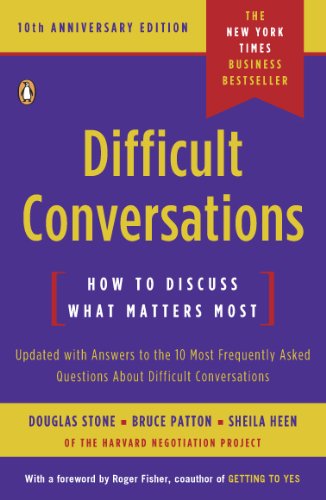
Difficult Conversations: How to Discuss What Matters Most

Whether you’re a CEO or a parent, we encourage you to make decisions as early and efficiently as possible, to explain those decisions clearly, and to take responsibility for their implementation and effectiveness. It is equally true that whether you are making a decision, implementing it, or problem solving, you can’t always, or even usually,
... See moreBruce Patton • Difficult Conversations: How to Discuss What Matters Most
Of course, in advance, we don’t know what we don’t know. But rather than assuming we already know everything we need to, we should assume that there is important information we don’t have access to. It’s a good bet to be true.
Bruce Patton • Difficult Conversations: How to Discuss What Matters Most
stand when engaging in a difficult conversation that requires you to deliver or enforce bad news. If you are breaking up with someone, it allows you to say “ I’m breaking up with you because it’s the right thing for me [here’s why], and I understand how hurt you are, and that you think we should try again, and I’m not changing my mind, and I
... See moreBruce Patton • Difficult Conversations: How to Discuss What Matters Most
you are still unable to see your contribution, try one of the following two approaches. Role Reversal Ask yourself, “What would they say I’m contributing?” Pretend you are the other person and answer the question
Bruce Patton • Difficult Conversations: How to Discuss What Matters Most
The problem with focusing only on clarifying our intentions is that we end up missing significant pieces of what the other person is trying to say. When they say, “Why were you trying to hurt me?” they are really communicating two separate messages: first, “I know what you intended,” and, second, “I got hurt.”
Bruce Patton • Difficult Conversations: How to Discuss What Matters Most
Here’s the problem: While we care deeply about other people’s intentions toward us, we don’t actually know what their intentions are.
Bruce Patton • Difficult Conversations: How to Discuss What Matters Most
in the great majority of cases, the reason the other person is not listening to you is not because they are stubborn, but because they don’t feel heard.
Bruce Patton • Difficult Conversations: How to Discuss What Matters Most
your friends or loved ones or colleagues don’t get their way, they’ll feel bad, and then you’ll have to deal with the consequences. That may be true, but it’s unfair to you. Their anger is no better or worse than yours.
Bruce Patton • Difficult Conversations: How to Discuss What Matters Most
It won’t be easy. In fact, it may be the toughest thing Walker ever does. But if he’s able to accept himself and his actions for what they are, and to take responsibility for them, both in his own mind and when talking with Annie Mae, he’ll probably find that over time his conversations with his daughter become easier.